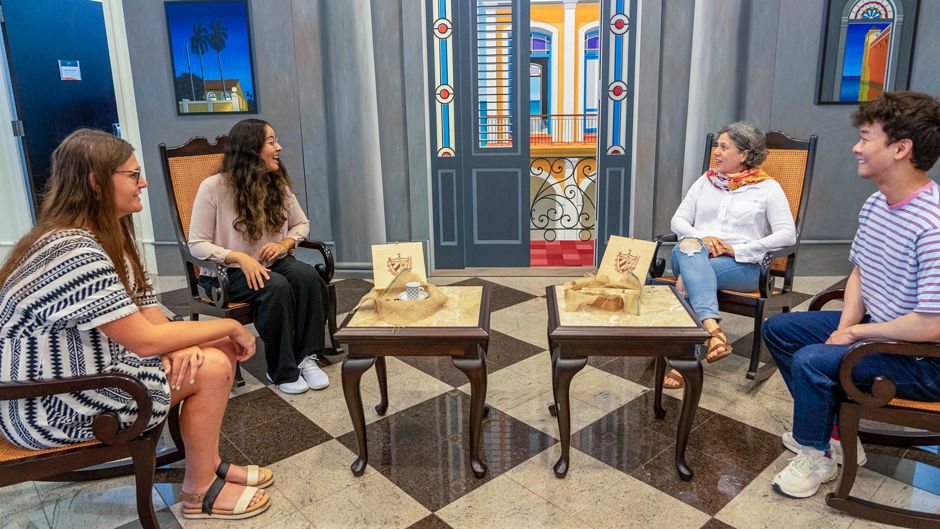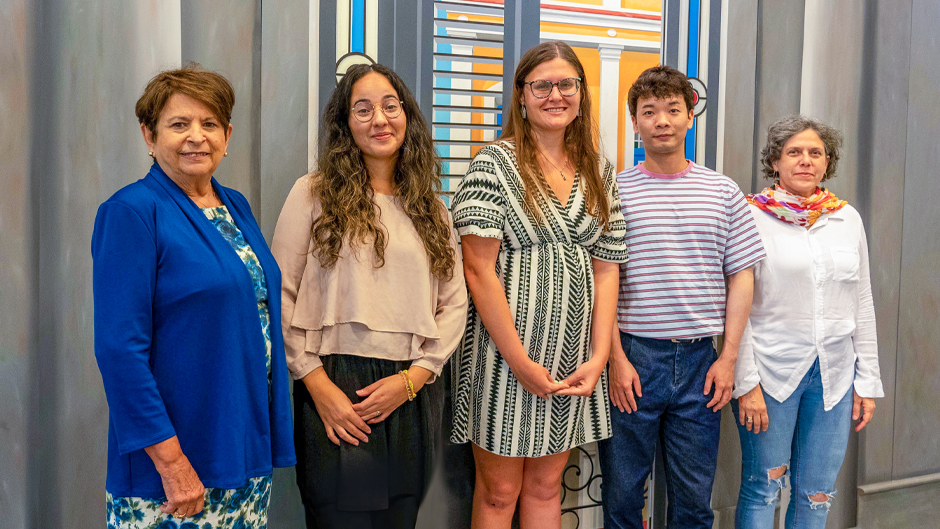Katie Coldiron is a doctoral student in history from Florida International University who is researching how Cuban Studies became an academic field in the United States.
Xu Peng, a doctoral student in Comparative Literature from the University of Connecticut, is studying how Chinese culture influenced the literatures and cultures of several Caribbean countries, including Cuba.
Both are spending part of the summer as Goizueta Graduate Fellows, scouring the multiple collections held at the Cuban Heritage Collection (CHC) at the University of Miami Libraries.
Well known for its immense repository of Cuban documents, books, photographs, and archives of the island, the CHC has grown to become the most important archive of materials dedicated to Cuba outside the island. Researchers have access to the wide range of materials.
“I honestly do not believe I could do this work without the CHC,” said Coldiron. “There is just so much there. It is the only one of its kind, and they have archives from different people and different places, including things from revolutionary Cuba.”
For Peng, who was born in China, the many archives at the CHC have provided unique vantage points into the Chinese presence in Cuba in the mid-19th century, when thousands of Chinese indentured workers were brought to the island, and beyond.
“I was reading a contract of indentured laborers who were brought to Cuba in the 1860s,” he said. “I was also looking at literary works that I could not find anywhere else. I am particularly excited about a play that the CHC has called “El Chino,” which was written by Carlos Felipe in 1947 and then was readapted later. I am very interested in seeing how the representation of the Chinese was in the past few decades.”
The Goizueta Foundation Graduate Fellowship Program provides for about 10 graduate students to spend one to three months working on their dissertations researching a topic of interest while using CHC material.

Launched in 2010 with a generous grant from The Goizueta Foundation, the program has supported the research of 141 emerging scholars from about 48 universities.
“The Goizueta Foundation Graduate Fellowships offer a wonderful opportunity for scholars to engage in the early stages of the research life cycle, promoting the use of CHC’s resources and contributing to the larger body of scholarship in Cuban Studies,” said Amanda Moreno, director of the CHC and interim Esperanza Bravo de Varona chair.
Many fellows have used the archives to build careers, write books, and become prominent in the Cuban Studies academic world. One of them is Michael Bustamante, associate professor of history, Emilio Bacardi Moreau Chair of the Cuban and Cuban American Studies at the University of Miami, and director of academic programs at the CHC. He was a Goizueta fellow in 2011 and 2012.
“The fellowship program has helped make the CHC a must-stop for those engaged in dissertation research related to Cuba and the Cuban diaspora,” said Bustamante. “It has also helped foster the next generation of Cuban Studies scholars in the humanities and social sciences, as demonstrated by the long list of significant publications by program alumni,” he added. “We are incredibly grateful to the Goizueta Foundation for the support that has made this tremendous program possible and has sustained it for over a decade.”
Besides research, Goizueta fellows also take part in New Directions in Cuban Studies. The biennial conference draws dozens of participants to listen to the latest scholarship on Cuba.
Kelly Urban, assistant professor of history at the University of South Alabama, was a Goizueta fellow in 2011 and again in 2013. She was studying the history of tuberculosis in 20th century Cuba, which eventually led to her book “Radical Prescription: Citizenship and the Politics of Tuberculosis in Twentieth-Century Cuba.”
“The Cuban Heritage Collection helped me in myriad ways and at different stages of my research,” she said. “Perhaps most importantly, my residence as a fellow was crucial in determining the parameters of my project.” She said that having access to wide-ranging, diverse sources proved key.
“In reviewing political collections, such as the Fulgencio Rubén Batista Papers and the Fulgencio Batista Zaldívar Collection, I was stunned by how many times tuberculosis appeared,” she said. “This led me to frame my study around questions of citizenship and state formation and to change the beginning of my historical narrative from the early 20thcentury to the Revolution of 1933.”
The Goizueta Foundation continues its support of the fellowship program and sees it as part of its mission.
“The Goizueta Foundation values the exploration and dissemination of Cuba’s history, politics, and culture in memory of my father, Roberto C. Goizueta, a proud Cuban exile who became chairman and CEO of The Coca-Cola Company,” said Olga Goizueta Rawls, board chair and CEO of the foundation.
“It brings us great pride to see how the Goizueta Graduate Fellowship Program continues to impact scholars of the history and culture of Cuba and enhance studies for their respective doctoral projects,” she said.

